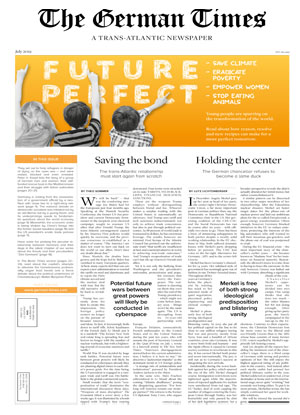The trans-Atlantic relationship must start again from scratch
We will be back” – that was the comforting message Joe Biden had for the Europeans just four months ago. Speaking at the Munich Security Conference, the former US vice president and current Democratic frontrunner in the incipient 2020 electoral campaign, sought to reassure US allies that after Donald Trump, the trans-Atlantic estrangement caused by his America First policies would quickly be overcome, and the previous consensus re-established as a matter of course. “The America I see does not want to turn our back on the world or our allies. Don’t have any doubt about that.”
Since Munich, the doubts have grown, and the hope fed by Biden has vanished in many European quarters. At best, many experts feel that one can expect a new administration to rescind the tariffs on steel and aluminum, and to rejoin the Paris climate accord and the nuclear deal with Iran. But the old narrative will be hard to revitalize.
Trump has certainly done his best to create this impression. His foreign policy centers no longer on the pursuit of broader interests and ideas. In fact, it increasingly boils down to tariff tiffs. Sylvie Kaufmann of the French daily Le Monde put it in a nutshell: “The former New York real estate king is spreading fear and horror no longer with the number of nuclear warheads, but with a frightening arsenal of economic sanctions and tariffs.”
World War II was decided by huge tank battles. Potential future wars between great powers will likely be conducted in cyberspace; already they are planting digital mines in each other’s power grids. For the time being, the US president is engaged in a rampant trade and tariff war. His battlefield is the global commercial system.
Small wonder that the term “weaponization of trade” dominates the international discussion these days. “Weapons of mass disruption” The Economist titled a cover story a few weeks ago. It was illustrated by a bomb tipped with Trump’s face roaring downward. Four terms were stenciled on its side: TARIFFS, TECH BLACKLISTS, FINANCIAL ISOLATION, SANCTIONS.
These are the weapons Trump employs without distinguishing between friend and foe. Whoever makes a surplus trading with the United States is automatically an adversary. And Trump uses tariff and tech sanctions indiscriminately not only to achieve trade concessions, but also to put through political outcomes. As 88 percent of world trade is transacted in dollars, he has enormous leverage. The results, however, are minimal. Fred Kempe of the Atlantic Council has pointed out the unfortunate truth “that tariffs are insufficient at best and counterproductive at worst in achieving non-trade outcomes.” And Trump’s weaponization of trade can’t but rile up America’s friends and allies.
Yet it is not only the bullying from Washington and the president’s nationalist, protectionist and populist instincts that worry the Europeans. The realization is dawning on them that even after the end of the Trump presidency – which might not come before January 2025 – things won’t be the same again. The US is decoupling from its 70-year-old partnership with Europe.
François Delattre, consecutively French ambassador to the United States and to the United Nations during the past ten years, who will assume the post of Secretary General at the Quai d’Orsay on July 1, wrote in a farewell article in The New York Times: “America’s disengagement started before the current administration. I believe it is here to stay.” He discerns a “Jacksonian impulse” as the dominant trend in US foreign policy – “a strange mix of unilateralism and isolationism” pursued by President Andrew Jackson in the 1830s.
In the same vein, Alain Frachon editorialized in Le Monde about the coming “Atlantic disalliance,” posing the disquieting question: “For how long will America remain our strategic partner?” His witness is the former US diplomat Tony Corn, who argues that the spirit of Alexander Hamilton is enjoying a resurgence in the United States. Hamilton, one of the US founding fathers, coauthor of the constitution and the first secretary of the treasury, was a mercantilist and, like George Washington and Thomas Jefferson, an opponent of “entangling alliances.” According to Corn, America’s elites feel that maintaining the liberal world order has reached the threshold of diminishing utility. “Americans are exhausted by the global leadership role,” concurs New York Times columnist David Brooks. He quotes two studies; according to the first, 20 percent of those surveyed were traditional internationalists, while the second found only 9.5 percent. In Brooks’ view, Donald Trump is the exponent of a fundamentally changed mood, attitude and foreign policy stance: No more constraints by rules and allies.
This analysis chimes with the view Sigmar Gabriel, German foreign minister from 2017– 2018, articulated in his recent book Zeitenwende in der Weltpolitik. “Regarding US policy,” he argues, “we have been relying on something we thought would eternally endure. But the pendulum won’t simply swing back…. We have to make Europe a global actor. This also calls for an enhanced capability to act militarily. In a world full of fiends and carnivores, a political vegetarian won’t be taken seriously.”
He has a point there, a sore point. As Alina Polyakova and Benjamin Haddad have underscored in Foreign Affairs, the current crisis in the trans-Atlantic relationship isn’t merely the result of a White House hostile to Europe; it is first and foremost the consequence of the power asymmetry between the United States and Europe. The EU is an economic titan, yet its lacks Weltmachtfähigkeit – the capacity to act decisively in the global arena. The rise of China is one reason why America is primarily looking to the Pacific, no longer to the Atlantic. Leadership fatigue is another. But it is Europe’s weakness, indecision and internal discord that makes decoupling an option free of cost.
The realization that Europe is no longer America’s priority, that the US defense umbrella has become leaky and Washington’s trade policy vexatiously selfish has shocked the Europeans into a bout of self-inspection. With friends like these, who needs enemies, European Council President Donald Tusk said last fall. Trump “has made us realize that if you need a helping hand, you will find one at the end of your arm.” Meaning, Europe is more or less on its own – a feeling German Chancellor Angela Merkel had likewise given vent to in a Bavarian beer tent.
The question is what Europe, wracked by Brexit, Franco- German incompatibilities, East European orneriness and populist afflictions everywhere, can do to manage the transition from a playground of other powers to a self-confident and self-reliant global actor. It will have to deepen its financial and social union, lest increasing inequality amongst member countries lead to further, perhaps fatal disruption. Carving out a greater role for the euro must secure Europe’s financial sovereignty. Moreover, the Brussels community must enhance the dynamism and the innovatory power of its economies, if it does not want to be crushed between the US and China. Rising and multiplying security challenges necessitate building up the EU’s military muscle by making planning and procurement more European, more connected and more capable. And in foreign policy, the EU must learn to speak with one voice if it wants to have any impact at all on international relations.
None of this will be easy; all of it will take time. But first steps have been taken. More is bound to follow, once the EU’s new leadership has settled in.
Norbert Röttgen (CDU), the chairman of the Foreign Affairs Committee in the Bundestag, shares this assessment. “The repercussions of Trump’s tenure will outlast his term of office, and the United States will be a different country for it,” he writes. “To save the trans-Atlantic alliance, both sides must make a significant effort. The United States needs to understand that to blame and threaten allies while withdrawing from multilateral agreements provides no basis for cooperation and trust. Europe, for its part, needs to develop a common foreign and security policy, and that will, at the very least, require real investments in its defense capabilities. If both sides do their part, the relationship could emerge from the current crisis more balanced and therefore stronger.”
It will be the task of American and European statecraft in the next few years to build a new relationship in a rapidly changing world order. We must all hope our leaders, our political elites and our voters are up to the task.
Theo Sommer
is Executive Editor of The German Times.




